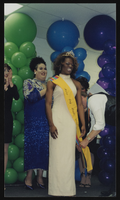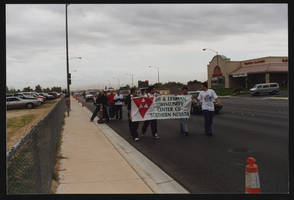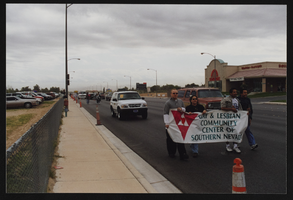Search the Special Collections and Archives Portal
Search Results

Gay Pride Pageant at FreeZone night club, Las Vegas, Nevada: photographic prints
Date
Archival Collection
Description
Image

James A. Gay III interview, 1973: transcript
Date
Archival Collection
Description
Interview with James A. Gay III conducted by Joyce M. Wright in 1973. Edited by Elizabeth Nelson Patrick, and transcribed for the project "Black Experience in Southern Nevada, Donated Tapes Collection," James R. Dickinson Library, University of Nevada, Las Vegas, December 1978. Arriving in 1946 from Fordyce, Arkansas, Gay became the first African-American mortician in Las Vegas. He later worked as Assistant Manager of the Sands Hotel and Casino and Union Plaza while serving as an executive board member of the Culinary Union. Instrumental in the Las Vegas community, Gay worked to improved race relations, addressing social, economic, and civic issues. Gay was awarded an honorary degree from the University of Nevada, Las Vegas in 1988.
Text
Web Archive on the October 1, 2017 Shooting in Las Vegas, Nevada
Identifier
Abstract
The collection is comprised of captured websites and Twitter data related to the mass shooting that occured at the Route 91 Harvest Festival in Las Vegas, Nevada on October 1, 2017. Captured websites are primarily comprised of articles and news stories from local, national, and international news media outlets. Websites were captured periodically from 2017 to 2018. The collection also includes Twitter data associated with the October 1 shooting that were captured via concurrent queries to the Twitter API for all Tweets containing the term “vegas” occuring September 29, 2017 to October 7, 2017. Also included are files containing tutorials for how to curate and analyze Twitter data which reference the 1 October Twitter dataset for illustrative purposes.
Archival Collection
Audio recording clips of interview with Hazel Gay by Claytee D. White, December 2, 1995
Date
Archival Collection
Description
Interview with Hazel Gay conducted by Claytee D. White on December 2, 1995. Hazel and her husband Jimmy Gay moved to Las Vegas in 1946, becoming leaders in the African American community during the civil rights era.
Sound
Frankie Perez oral history interview
Identifier
Abstract
Oral history interview with Frankie Perez conducted by Elsa Lopez and Laurents Bañuelos-Benitez on November 05th, 2018 for the Latinx Voices of Southern Nevada Oral History Project. Perez speaks about the importance of sports, and the lack of Latinx representation in teachers during high school. Perez then discusses being placed on medical hold in the military, how his transition affected his physical tests, how the 2016 election may have impacted transgendered people in the military, and how everyday military personnel feel about transgendered people serving in the military. The interview concludes with Perez discussing the Lesbian, Bisexual, Gay, Transgendered, and Queer (LGBTQ) scene in Las Vegas, Nevada and about how culture impacts which clubs members of LBGTQ community would visit.
Archival Collection
Las Vegas Bugle Photograph Collection on Lesbian, Gay, Bisexual, and Transgender History
Identifier
Abstract
The
Archival Collection

Gay and Lesbian Community Center of Southern Nevada in the second annual Gay Pride parade, image 001: photographic print
Date
Archival Collection
Description
Image

Gay and Lesbian Community Center of Southern Nevada in the second annual Gay Pride parade, image 002: photographic print
Date
Archival Collection
Description
Image
Game On! The Oral History of Las Vegas Sports Interviews
Identifier
Abstract
The Game On! Oral History of Sports in Las Vegas interviews (2024-2025) contain all oral history interviews conducted by UNLV University Libraries Oral History Research Center. This project centers on documenting the history of sports in Las Vegas, including interviews discussing the earliest teams to the most recent champions. Interviews cover a wide array of sports including hockey, football, baseball, softball, auto racing, tennis, basketball, poker, boxing, rodeo, golf, running, esports, and more. Digital audio available for all interviews; check collection inventory for individual narrators and more detailed information on specific interviews.
Archival Collection
